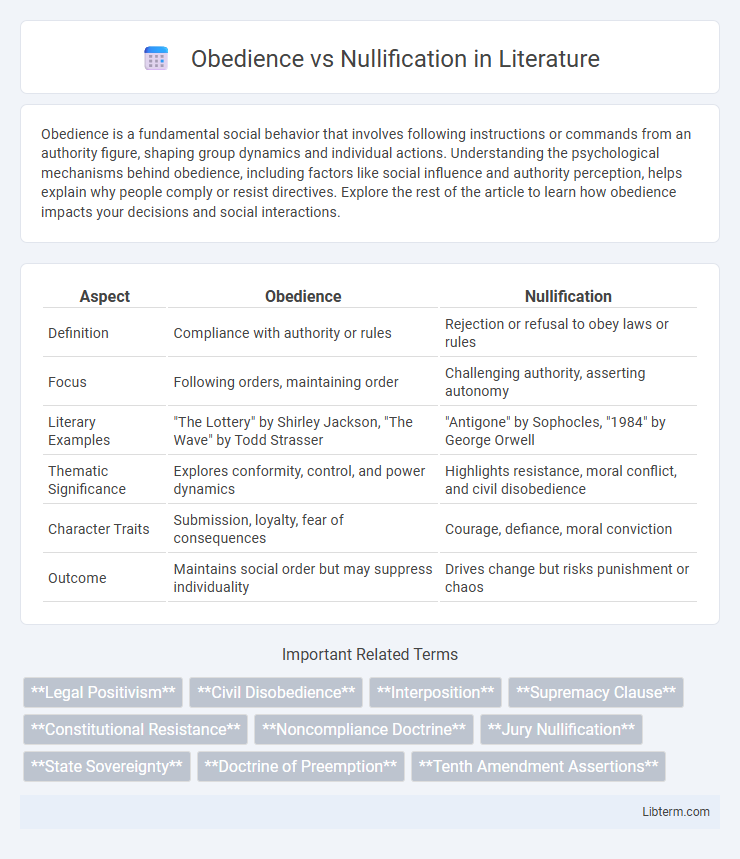Obedience is a fundamental social behavior that involves following instructions or commands from an authority figure, shaping group dynamics and individual actions. Understanding the psychological mechanisms behind obedience, including factors like social influence and authority perception, helps explain why people comply or resist directives. Explore the rest of the article to learn how obedience impacts your decisions and social interactions.
Table of Comparison
| Aspect | Obedience | Nullification |
|---|---|---|
| Definition | Compliance with authority or rules | Rejection or refusal to obey laws or rules |
| Focus | Following orders, maintaining order | Challenging authority, asserting autonomy |
| Literary Examples | "The Lottery" by Shirley Jackson, "The Wave" by Todd Strasser | "Antigone" by Sophocles, "1984" by George Orwell |
| Thematic Significance | Explores conformity, control, and power dynamics | Highlights resistance, moral conflict, and civil disobedience |
| Character Traits | Submission, loyalty, fear of consequences | Courage, defiance, moral conviction |
| Outcome | Maintains social order but may suppress individuality | Drives change but risks punishment or chaos |
Understanding Obedience: Definition and Context
Obedience refers to the compliance with authority or rules, often driven by a perceived legitimacy of the command or social norms. It is essential to differentiate obedience from mere conformity, as obedience involves explicit directives from a recognized authority figure. Understanding obedience within psychological and sociopolitical contexts highlights its role in maintaining order, yet also raises critical questions about moral responsibility and individual autonomy.
The Concept of Nullification Explained
Nullification is a legal theory asserting that a state has the right to invalidate any federal law deemed unconstitutional within its borders. Rooted in the principle of state sovereignty, nullification challenges federal authority by allowing states to refuse enforcement of certain federal statutes. This concept gained prominence in the early 19th century, notably during the Nullification Crisis, highlighting tensions between state and federal powers.
Historical Perspectives: Obedience and Nullification
Historical perspectives on obedience and nullification reveal contrasting responses to governmental authority during critical moments such as the nullification crisis of the 1830s. States like South Carolina asserted the right to nullify federal laws they deemed unconstitutional, challenging the balance of state and federal powers established by the U.S. Constitution. This tension illustrates the ongoing conflict between obedience to federal law and the assertion of state sovereignty through nullification as a form of political resistance.
Legal Implications: Where the Two Diverge
Obedience in legal contexts refers to the compulsory adherence to laws and court orders, ensuring societal order and authority legitimacy. Nullification, on the other hand, involves the rejection or invalidation of certain laws or rulings by individuals or groups, challenging the legal system's uniform application. The divergence lies in obedience upholding law enforcement and nullification potentially leading to legal uncertainty and conflicts with established judicial authority.
Philosophical Foundations: Authority vs. Autonomy
Obedience often rests on the philosophical foundation of authority, where individuals accept external rules or commands as legitimate and binding, emphasizing social order and collective stability. Nullification, in contrast, prioritizes individual autonomy, asserting the right to reject or resist laws or directives perceived as unjust or illegitimate based on personal or communal ethical judgments. This tension between authority and autonomy underpins debates on governance, civil disobedience, and the moral limits of obedience within political and legal philosophy.
Social Consequences of Obedience
Obedience often leads to conformity within social groups, reinforcing societal norms and hierarchies through compliance with authority. This behavior can suppress individual moral judgment, resulting in social consequences such as loss of personal autonomy and potential complicity in unethical actions. Social psychologists highlight that obedience may maintain social order but also risk perpetuating systemic injustice when authority is unquestioned.
Impact and Ethics of Nullification
Nullification challenges the legal authority by rejecting certain laws deemed unconstitutional or unjust, raising significant ethical questions about the balance between individual conscience and societal order. The impact of nullification can undermine the uniform application of law, potentially fostering legal fragmentation and social discord. Ethically, it prompts critical debates on civil disobedience, the moral duty to resist unjust laws, and the potential consequences for democratic governance and rule of law.
Case Studies: Obedience and Nullification in Action
The Milgram experiment exemplifies obedience, demonstrating how individuals comply with authority figures even when instructions conflict with personal morals. In contrast, resistance movements during the Civil Rights era illustrate nullification, where communities collectively reject unjust laws to uphold ethical standards. These case studies highlight the tension between following authority and asserting moral autonomy through civil disobedience.
Factors Influencing Choices Between Obedience and Nullification
Factors influencing choices between obedience and nullification include perceived legitimacy of authority, potential consequences of disobedience, and individual moral values. Social context, such as peer pressure and cultural norms, heavily impacts decisions, while personal experiences with authority figures further shape obedience behavior. Cognitive processes like risk assessment and justification mechanisms also play crucial roles in determining whether individuals comply or resist commands.
Striking a Balance: Navigating Authority and Resistance
Striking a balance between obedience and nullification requires a nuanced understanding of when to comply with authority and when to resist unjust commands. Effective navigation involves recognizing lawful directives that maintain social order and identifying actions that infringe on individual rights or ethical principles. This balance fosters a society where authority is respected without sacrificing critical judgment and moral responsibility.
Obedience Infographic

 libterm.com
libterm.com